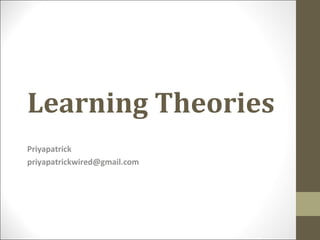
learning theory
- 2. Learning Theories • Philosophers and educators researched ways to understand and explain the process of learning. • Understanding learning theories helps educators know how to communicate content to the students effectively. • Educators will then organize delivery of instruction and help students become successful.
- 3. Behavior Learning Perspective • Behaviorism which was the predominant school of experimental psychology in the early 20th century. This was influenced by Ivan Pavlov, B.F. Skinner, and other physiologists. • They proposed that psychology could only become an objective science if it is based on observable behavior in test subjects. • Since mental events are not publicly observable, behaviorist psychologists avoided description of mental processes or the mind in their literature.
- 4. Edward Thorndike • Thordike’s research consisted of experiments that required a voluntary behavioral reaction from subjects. • Animals were confined in cages or food and were placed in a latched box. They had to open the box or cage to get to food. • These experiments were called instrumental conditioning or connectionism.
- 5. Edward Thorndike • Experiments were designed to determine if animals solved a problem through reasoning or by a more basic process. • Thorndike experimented with baby chicks, dogs, cats, monkeys and fish. • A puzzle box was used to get each animal to trip a latch. The animals would claw, bite, scratch, and claw against the sides of the box. • Repeated confinements decreased the time it took for the animals to escape confinement.
- 6. Thorndike’s Connectionism • Thorndike referred to his experiments as instrumental conditioning or connectionism to reflect a difference from Pavlov’s classical conditioning. • Problem solving strategies were associated with connections between the stimulus or the problem and the appropriate responses.
- 7. Thorndike’s Connectionism • Application of Thorndike’s laws to education • Human mental life is describes as consisting of: • mental states and movements with connections between ideas. • Learning is the process of connecting. • “The mind is man’s connecting system” Thorndike. • For example, numerical problems and their answer, events and dates, and persons and characteristics.
- 8. Laws of Learning Thorndike’s research showed the correct response was strengthened and the incorrect responses were weakened. He then identified three major laws of learning to explain the process: 1.Law of Effect – a satisfying effect following the response strengthens the connection between the stimulus and the behavior. 2.Law of Exercise – repetition of the experience increases the probability of a correct response. But, it will not enhance learning without a satisfying effect following the response. 3.Law of Readiness – the execution of an action in response to a strong impulse is satisfying. But, the blocking of an action or forcing it is annoying.
- 9. Thorndike’s minor laws to education. Law 1. Multiple response or varied reaction 2. Attitudes, dispositions, or states 3. Partial or piecemeal activity of a situation. 4. Assimilation of response by analogy 5. Associative shifting Description 1. A variety of responses often occurs initially to a stimulus 2. Condition of the learner that influences the learning 3. Tendency to respond to particular elements or features of a stimulus situation 4. The tendency of a situation B to arouse in part the same response as situation A. 5. Successively altering the stimulus until the response is bound by a new stimulus.
- 10. Classical conditioning in the classroom • Classical conditioning impacts teaching in that students’ need to experience positive reactions in developing an appreciation of science, art, literature and other subjects. • Negative emotional reactions may lead to passive behaviors of apathy or “tuning out.” • For example, the anxiety associated by adults pursuing education can be changed by introducing strategies that can elicit positive reactions. • For example, adults can be greeted warmly as they arrive and no difficult material should be introduced in the first week so that they can get used to classroom activities and routines. • The anxiety is reduced by pairing the new routine or activity with a warm greeting and enjoyable activities.
- 11. Behavior Learning Theory • According to Gredler, behaviorism has three basic assumptions about learning: 1. Observable behavior should be the focus of study 2. Behavior should be studied in simple elements. 3. The process of learning is behavioral change.
- 12. Cognitive Learning Theories • Fritscher defines cognitive learning as an attempt to explain human behavior by understanding the thought processes. • The idea relies on the assumption that humans are logical beings that make the choices that make the most sense to them. • Comparing the human mind to the computer is a way to describe mental processing and is referred to as information processing.
- 13. Cognitive Theories • Cognitive theories present a positive view of development, emphasizing conscious thinking. • Cognitive theories emphasize on the individual’s active construction of understanding. • They explain the importance of examining developmental changes in children’s thinking.
- 14. References • Asiaeuniversity. Chapter 5. Cognitive Theories. http://peoplelearn.homestead.com/BEduc/Chapter_5.pdf • Fritscher, Lisa. Cognitive Theory. About.com Guide. April, 2011. http://phobias.about.com/od/glossary/g/cognitivethedef.htm • Gredler, Margaret E. Learning and Instruction: Theory Into Practice. Third Edition. 1997. pp.23-26, 33-38.